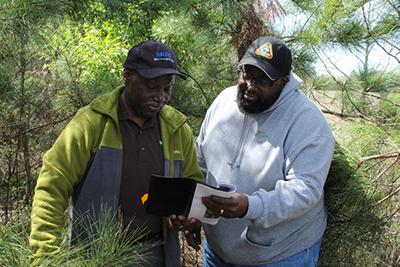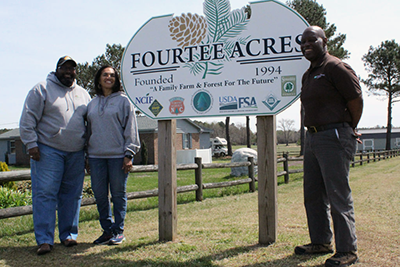
Roanoke Electric Cooperative’s Sustainable Forestry and Land Retention Project is one of eight community-based organizations selected in 2013 to administer the national Sustainable Forestry and African American Land Retention program.
The U.S. Endowment for Forestry and Communities created the program after decades of declines in African American farm ownership.
In the 1920, Black farmers owned between 16 million and 19 million acres of rural land and accounted for about 14 percent of the nation’s farmers. Today, they comprise less than 2 percent of farmers and own less than 5 million acres, according to data from the U.S. Department of Agriculture (USDA)’s Census of Agriculture.
“In addition to discriminatory practices by agencies, African American landowners were denied access to resources because they weren’t informed of technical resources available to them or informational opportunities to learn the importance of estate planning to reduce the risk of heir property [land owned by two or more people in which there’s no will],” said Alton Perry, project manager at the Ahoskie-based co-op.
Perry and his staff help participants establish legal ownership of their properties to ensure that valuable land stays in their families. Landowners also learn forestry management techniques to transform unprofitable family farms and forests into economic assets.
“The Sustainable Forestry and Land Retention Project addresses what landowners might see as a liability,” Perry said. “But through education and access to technical assistance, capital and estate planning services, now their forestland has the potential to become an economic, environmental and social asset for the family.”
Perry, who forged strong connections with public agencies and conservation advocacy groups during an early career in forestry, hosts informational webinars, conferences and workshops, attended by about 200 nearby landowners. He’s helped dozens gain access to agencies and other resources for forest management and estate plans. Perry estimates that, through this program, local landowners are implementing sustainable forestry and conservation practices on about 13,000 acres of land.
“Alton deserves a ton of credit for taking something from scratch and turning it into one of the best forest landowner programs in our area,” said Chris Brown, Community Relations Manager at Enviva, a wood pellet manufacturer that operates nine plants in the Southeast, including two in Roanoke Electric’s service area. “He has a great ability to bring people together, from the industry to conservation folks to landowners.”
Enviva is one of two industry partners supporting the Roanoke Electric program with grants and technical assistance for landowners. Since 2017, it has given $50,000 in financial assistance for forestry and legal services and provided on-staff foresters to consult with participants at workshops or on their properties.
Brown said he believes that community-based projects like Roanoke Electric’s are vital in righting past wrongs because they connect landowners and state authorities in a low-pressure atmosphere.
“There’s been a reluctance among the African American community and some of the other underserved communities in rural North Carolina that agencies or private businesses might not have their best interests at heart,” he said.

Others, like the Kylers, are just beginning.
Kyler family members are scattered across the country, but their roots are in Enfield, North Carolina. Recently, they learned those roots run a good bit deeper when they discovered they own a significant piece of forestland in Enfield.
The discovery set in motion a complex legal process that’s been aided by Roanoke Electric, where many Kyler relatives are members. Co-op staff are working with the family to detangle legal and other land issues and to ultimately develop a forest management and land retention plan.
“It has been a positive experience working with [the co-op],” the family said. “We’re now going through the process of finding out how much we own, what’s tillable, what’s farmable and what’s open.”
Family members said they were disheartened to learn about the discrimination Black farmers have faced, and they are determined to know all they can about their land.
“[Roanoke Electric] is really educating us on forestry and conservation,” the family said. “It’s one thing to own property, but something totally different to own property and cultivate it for the next generation.”


